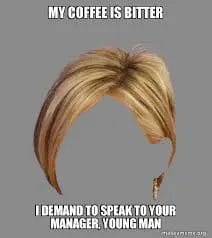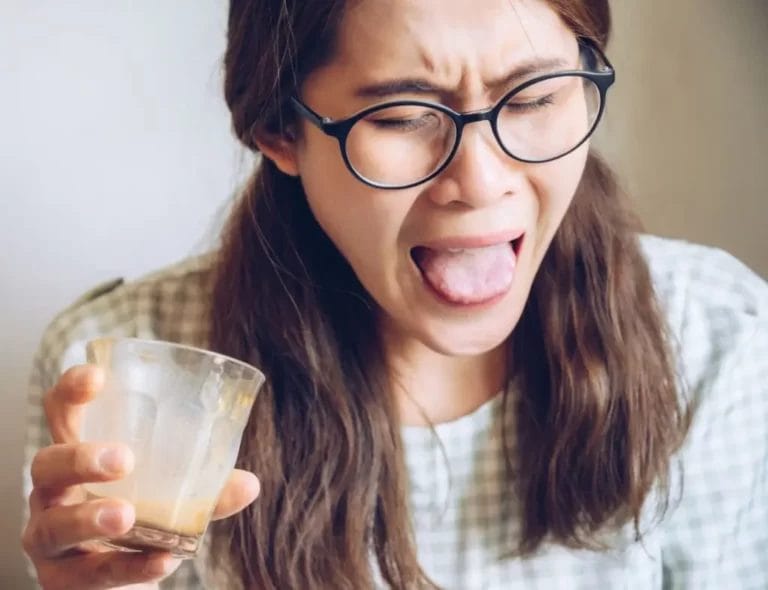The sweetest thing on earth is a cup of bitter coffee. For the weak hearted ones, it’s a package of horrible taste in their mouth, coupled with insomnia.
Since you have ended up here, you are a bitter coffee lover, or you hate bitter coffee like a sin, searching for ways to run away from it.

In both cases, you need to know which coffees taste the most bitter in the world.
As a bonus, we’ll also discuss the reasons that make your coffee bitter.
Bitter Coffee Drinks
Thou shall read the favorite part of the bitter coffee lovers. Craving for bitter coffee is a personal preference and is entirely natural.
If you love the coffee’s bitterness, say it out loud! Black coffee, espresso, Lungo, and Ristretto are the most common bitter coffee drinks. Let’s find out your preference from the descriptions.
Black Coffee
Coffee lovers have a soft corner for black coffee, a dark and timeless classic. Sadly it ain’t got no milk.

Or sugar and no flavors. It just doesn’t taste delightful like the milky ones.
Its natural taste and intense flavor contribute to the uniqueness of this drink. In addition, drinking black coffee is associated with numerous health benefits.
Black coffee is easy to brew in coffee makers and light on the wallet. Therefore, it would be best to give black coffee a chance to be part of your daily habit if you’re not lactose intolerant.
Espresso
Espresso is a strong drink of 25-30 ml. It works as the heart and soul of many other coffee drinks—for example, Cappuccino, Caffe latte, or flat white. A shot of espresso is a package of richness, bitterness, and a strong flavor. It gives you a punch of concentrated caffeine.
The richness comes from a smooth velvety crema. An espresso shot usually contains one fl oz of the drink. Each sip offers you a deliciously bitter taste with a massive power boost.

Espresso Lungo
Espresso Lungo is a must-try when you desire even more bitterness in your coffee beverage. Its brewing method is similar to espresso but extracted a little longer. So, it has a longer brewing time, and more water flows through the grounds.
The bitter compounds left undissolved in a regular espresso become extracted in Lungo. The result is a bitter, tasty, less strong, and less rich cup of joe.
Ristretto
Ristretto is a very strong and concentrated coffee drink. However, it is less bitter due to the shorter extraction time. In addition, ristretto is prepared using less water than espresso.
As a result, you get some bitterness with intensity, richness, and caffeine punch.
Torrefacto Coffee
This coffee isn’t famous in the US or the UK. But it’s a choice for many in several Latin American countries, Spain and Portugal.
If you are not familiar with it, torrefacto coffee is roasted with sugar and combined with different coffee roasts.
Torrefacto coffee has a strong bitter taste after being roasted with sugar. The superheat condenses the sugar and caramelizes and burns, mixing with the coffee beans. The outcome? Oh yeah! Just like you thought, it has a very strong, bitter taste.
Is There A Less Bitter Coffee That Is Strong?
There is a saying floating among most people. ‘Coffee should be dark as hell, strong as death, and sweet as love.’ They love the coffee’s strong flavor but cannot stand the bitterness associated with it. Here’s how to enjoy a strong cup without dealing with bitterness.
First things first, choose the coffee ground.
The bean variety you want is a blend containing Robusta coffee. The force is strong with Arabica making it superior quality and tastes much less bitter, the coffee feels weak. Robusta blends in an espresso gives you goosebumps with the first sip. It is strong enough to add light years to your life.
Try to purchase beans that are collected from fully matured coffee cherries. It has an enhanced body and flavors. But, most importantly, buy fresh beans. Sitting on shelves for too long makes the coffee taste bitter and stale. And choose a darker roasted coffee bean to enjoy the rich and strong flavors. But be careful not to over-extract the grounds during brewing.
Secondly, prepare the coffee with clean equipment. Any coffee residue from the previous brew adds an unpleasant bitter and burnt flavor. Make sure to clean your gear after every use. And lastly, add some cream to counteract the bitterness. So, you can still enjoy the strength of intensity in your cup of coffee.
And if you want to take the easy way out, you can always try out a cold brew. Unless over-steeped, cold brews always taste less bitter while providing you the necessary caffeine to continue.
15 Reasons Why Your Coffee Tastes Bitter
Coffee is naturally associated with bitterness. But some cups of coffee taste more bitter than others. Therefore, you have to choose your coffee wisely according to your taste buds’ preferences. So, what does the level of bitterness depend on?
Let’s learn them at a glance.
You Chose The Bitter Coffee Bean Variety
Some types of coffee beans are born bitter. For example, robusta coffee plants produce only bitter beans. These beans are far more bitter than the high-quality Arabica beans.
Robusta contains a burst of bitter elements, chlorogenic acid, and caffeine. As a result, the content is much higher than Arabica beans.
The Robusta variety has a sugar content half that of the Arabica variety. It is primarily present in coffee blends and instant coffees. They are also cheaper than the Arabica variety. However, Robusta is considered inferior in both taste and flavor.
Your Roasting Level Isn’t Perfect
The longer coffee beans are roasted, the bitter they turn out. Want to know how? Here’s the science.
The roasting process is necessary to bring the aromas, flavors, and tastes of beans. The unroasted raw beans are flavorless and tasteless. During the roasting, a lot of moisture evaporates from the beans. At the same, the beans undergo chemical and physical changes.
The beans contain chlorogenic acid, which is inactive in raw form. However, roasting activates chlorogenic acid and breaks it into chlorogenic acid, lactone, and phenylindane. These acidic compounds produce a bitter taste in your cup of coffee. Phew, that was a mouthful…

The higher the roasting level, the greater is the amount of bitter compound in beans. Therefore, the dark roast coffee tastes severely bitter than the light roasts.
In the USA, there are more precise terms for specific roasts and their profiles for the convenience of coffee drinkers. A few popular dark roast profiles are:
- Vienna Roast
- Full City Roast
- Italian Roast
- French Roast
Keep experimenting with different roasts till you find your sweet spot. Or, should I say, bitter spot?
The State of Coffee Cherry
Consider the taste of mangoes. The ripe yellow mangoes are sweet as honey. In contrast, the raw green mangoes are sour and bitter. The same goes for coffee.
The coffee farmers may pick the coffee cherries before they have ripened. But, unfortunately, the resulting beans also get filled with a lot of bitterness.
The raw coffee cherries have a higher content of chlorogenic acid. As the cherries mature with time, the beans turn sweeter and sweeter. This sweetness fades after the fruits have hit a peak level of maturation.
So, if you are experiencing harsh bitterness in coffee, chances are the beans were picked untimely.
You’re Using Stale Beans
We all know by now that coffee beans go bad if they are kept around in less optimal conditions for more extended periods. But did you know that old beans can make your coffee more bitter than you want it to be?
After a certain time, coffee beans start letting out a “stale” flavor and aroma. If you are someone who grinds a fresh batch every morning, you’ll notice it right away. Stale beans taste more bitter than the usual ones when you grind them.
It’s why we recommend keeping a short amount of beans at hand and only grinding what you need for the day. Because once the beans have gone stale, there is no way to bring the original taste back.
You Cheaped Out On The Beans
Who doesn’t love a good deal? The idea of getting your favorite coffee for a price that’ll go easy on your wallet sounds lucrative, but that may not always be the best idea.

Cheaper coffees rarely are of higher quality, and to find a combination of affordable yet good, you need lady luck on your side. Usually, cheap coffee tastes, well, cheap.
Fine quality fresh beans may cost you a bit more than the fine discount deal at the local market, but it ensures your morning isn’t ruined by bitterness.
You’re Brewing For A Longer Time
Longer brew time results in a more bitter taste in coffees because the brewing water helps to extract soluble flavor compounds from the beans.
The extra brew time allows you to over-extract the bitter flavors if you overdo it. Around 18-22 % of soluble components extracted in a cup of coffee are acceptable.
Over-extracted coffee makes your cup taste bitter. On the other hand, an under-extraction leads to a sour and weak-tasting coffee. Experiment with a stopwatch to figure out the best fit for your taste.
You’re Steeping Coffee Too Long
Are you an AeroPress or French press user? If the answer is a French press, learn about the perfect time to push down your plunger. Using a timer to control brewing time is a great idea.
If you do not want the bitterness in your french press coffee, buy a thermal pot. Rather than leaving the leftover in the press, store it in the thermal pot right after the extraction.
If you are a pour-over user, learn how fast the water has to pour. The slower you pour, the longer the extraction time. In addition, the grinds will have extended contact time with the water, which brings out more bitterness. Use a goose-neck kettle to control the amount of water more precisely.
Using The Wrong Grind Size
Generally, finer ground coffee has a higher surface area allowing for greater extraction. However, every coffee brewing technique has a suggested grind size. A wrong ground size can make a bitter or sour cup. Here’s a table to make it easier.
| Grind Size | Brewing Method |
| Coarser Grind | French Press/Percolator |
| Medium Grind | Regular Coffee Maker |
| Fine Grind | Cone Shaped Coffee Maker Filters |
| Extra Fine Grind | Pump/Steam Espresso Machines |
Finer grinds can also cause bitterness of coffee by causing over-extraction. When too much coffee is introduced into the solution, the final product is a bitter brew.
You’re Mixing More Coffee & Less Water
Just like more sugar makes your dessert sweeter, more coffee grounds make a cup of coffee strong and bitter. The recommended ratio ranges from 1-2 tablespoons of coffee ground per cup of water.
This amount varies with the brewing technique. Figure out the perfect coffee to water ratio that suits you, or follow the “golden ratio”: 18 grams of water per gram of coffee.
How Clean Is Your Water?
It’s not just about the correct ratio, the quality of the water in the solution can also affect the overall taste. But how?
If you are using hot water from the tap for an everyday brew, there is a high chance that the water contains different minerals and chemicals. These minerals, when heated, can affect the brew and the overall taste.
You can use tap water if you are already using a water filter to avoid risking unknown minerals being introduced in your cup.
You’ve Set A High Temperature
A water temperature too high can extract more flavor notes. Extraction of flavor compounds is also associated with taking out the bitter compounds.
The temperature of boiling water is too high for brewing a cup of coffee. The ideal temperature is just below the boiling point.
When the temperature of coffee reaches beyond 474∘F, the coffee beans start losing their natural brown color and begin to turn black from burning. Burnt coffee beans result in a bitter cup as the final product.
Having fun Nomies? Check out our piece on is it possible to be allergic to coffee.
Your Coffee Maker Is Not Clean
It is your responsibility to keep the coffee-making equipment clean after each use. Clean equipment makes a fresh and hygienic brew every time. The leftover coffee residue adds to the bitterness of future cups.
Even if you are a bitter coffee lover, I recommend staying tidy. For example, do not use dirty equipment only to make a bitter cup. This results in bad coffee that will only do you more harm than good.
Your Coffee Maker Is Old
So now that you know all the tips and tricks, you got yourself the finest beans for a reasonable price, you kept the coffee-water ratio just right, and you kept the grind consistent as well. But what’s this? Your coffee still tastes like bitter gourd juice.

When you do everything right, and the coffee still tastes bad, it’s not your fault. Instead, it’s time you got yourself a new coffee machine. Yes, older devices can mess your coffee up even when you do everything right, and the only fix here is to start looking for a new machine as soon as possible.
Your Equipment Isn’t Right
This is a minor point, but it’s still essential. For example, sometimes making a particular brew of coffee without the right equipment can cause the flavor to fluctuate heavily, the primary symptom of which is, you guessed it, heavy bitterness.
Sometimes you can get away with applying specific methods to get the best out of the brew, but there are times when an expensive machine for a particular brew of your choice makes more sense. For example, an Espresso machine.
You’re Drinking From The Wrong Pot
No, it doesn’t mean you’re drinking from someone else’s coffee brew. However, the element your coffee cup/ mug is made of affects your coffee taste to a certain degree. This is another minor issue that you may never notice but contributes to the bitterness.
Plastic cups are an everyday go-to. But plastic cups make the coffee taste either stale or bitter. The best option is a glass or a ceramic mug for coffee drinking.
And if you are traveling or are outside, stainless steel coffee mugs are the way to go.
The Bitterness Is Essential
Coffee beans contain natural bitterness. This bitterness is good until it is harsh on your taste bud. We need it to make our coffee attain the taste of coffee. There is either too much sweetness or acidity in a cup with no bitterness.
So, the key to a balanced cup is the bitter compounds that most people hate. It is essential to enhance a variety of other flavors and their complexity. That includes herbal, floral, fruity, nutty, chocolaty, spicy, and whatnot.
Had fun reading? You’ll love to read our piece on best ways to make coffee at work.
Bottom Line
Some want to know about bitter coffees so they can enjoy them. Others want to know so they can avoid them. In this article, we decided to help out both.
So, which one are you?
FAQs
The Robusta beans variety tastes the most bitter. The reason is that Robusta contains high contents of bitter compounds, caffeine, and chlorogenic acid. Also, the natural sugar content in Robusta is much lower.
Coffee beans contain natural bitterness. There is no coffee in the world with zero bitterness. This bitterness is excellent and essential to enhance a variety of other flavors. However, there is either too much sweetness or acidity and no balance in a cup with no bitterness.
Yes. A pinch of salt can mellow the bitter taste from a brew. So, the bitterness fades, and the flavors get enhanced.
Dark roast coffee tastes far more bitter than the lighter roasts because the longer the coffee is roasted, the more bitter they become. Because during roasting, chlorogenic acid breaks up into chlorogenic acid lactone and phenylindane. These are the bitter compounds of coffee.
A cream is a form of milk. And milk contains lactose that has a natural sweetness. As a result, adding cream to a coffee cup helps counteract the bitterness.

